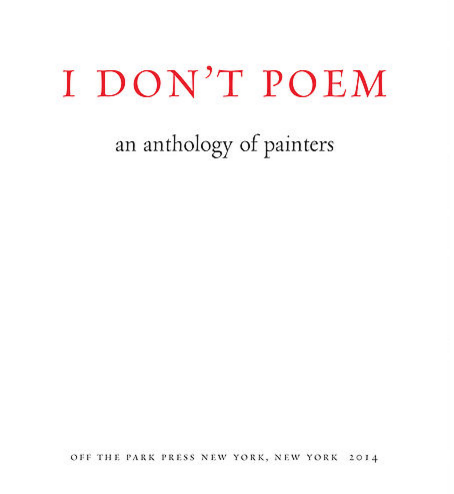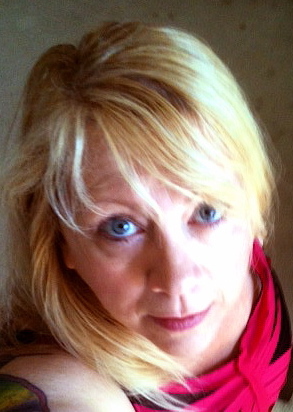Ronna Lebo -- artist, writer, musician, mother of two, grandmother of two -- learned a lot about living from birthing, mothering, and creating. The main lesson she learned, the big takeaway, for her was "Life goes on." Her work is featured in I Don't Poem, an anthology of painters collected by Claudia La Rocco for Off the Park Press. Lebo didn't follow a traditional path--ever--and her rule breaking is captivating on so many levels.
So tell me about how you came to be in your senior year of high school, married with a baby on the way instead of on your way to the Air Force Academy?
Oh, high school...Such a romantic time for a lot of people... such a strange time for me. I was a swimmer on both the girl's team and the boy's. I swam on the boys' 400 meter relay team, because my 100 meter time was fourth fastest in both girls and boys teams combined. This was in the mid 1970's, and Title IX had been established, so our boy's swim coach took advantage of that and moved me into a boy's 400 meter relay slot. I swam twice a day every day during swim season, 6:00 am practice with the boy's team, and 4:00 pm practice with the girls.
Due to good grades and my swimming abilities, I had been recommended by my high school principal to the Air Force Academy as a candidate for the 1976 freshmen class, which included the first women to be accepted into the program. I had been interviewed and accepted, but then found out I was pregnant and had to decline the appointment. (I did go to a clinic across the state border to have an abortion, but after showing up and talking to the doctor there, I decided against it.)
My boyfriend was already a student at Purdue University, so we married and I moved to West Lafayette, IN to finish high school there as a pregnant and married student. That was not easy. I had no friends and the students were not open to hanging out with an obviously pregnant new girl. Of course, I could not swim or compete in other sports. I didn't participate in any extra-curricular activities of any kind. My husband and I lived in married student housing on Purdue's campus, and that was also a lonely place for me.
The overwhelming loneliness and shame compressed my experiences. In my memory, that period of time seems like it all happened in just a couple of weeks.
How did that feel at the time? What did it take for you to start to find the silver lining in this rule breaking? What do you feel you gained from this experience (aside from your wonderful children and now grandchildren)?
Once my daughter was born, I started thinking about how to stay on track as far as going to college was concerned. I'd earned a state commendation because of good grades in high school, so I applied to the state to see if I could qualify for a scholarship as an independent minor. I got a full ride to Purdue, so that was the silver lining for me. I only completed two years of studies at Purdue before my husband got his first job at McDonnell Douglas in St. Louis, MO, and we had to move. I didn't make it back to college until 1986, when I began art school in Manhattan at the School of Visual Arts, which was also interrupted. I finally completed my BFA and MFA at Mason Gross School of the Arts, Rutgers University in 2003, and 2005.
I think what I gained from these continued upheavals and interruptions was a strong will to persevere; to try to stay on track no matter what happened in my life. I had robbed myself of a sense of confidence in my own achievements in high school, but I still came away feeling confident that I could achieve whatever I set out to do, eventually.
Mothering isn't the only way you create in this world. You are also an artist, writer, musician. How did you experience with Alice B. Talkless help you to break rules? What price did you pay for breaking them?
Alice B. Talkless was the poetic and musical portions of my intelligence finally coalescing and demanding an arena in which to perform. My sister, Amy Mayhem, was the catalyst that ignited the fire. She bought me a guitar and told me to start talking and singing into the microphone. She picked up her bass guitar and started driving melodies to the words I was spewing. I added my own guitar ephemera, and voila...we were Alice.
We broke a lot of rules, the first one being that the bass guitar was playing the melodies while my guitar was acting as ethereal background noise. Our original recordings were always on a four track in the living room, where we would do things like put battery powered toys in a fish tank and record whatever sounds they made, then include that somehow in a song. We wrote political songs appropriate to topics that were current in the nineties. There was a song about burning brides, there was a song about the million man march, there was a song about Mormon girls being born as sex slaves, etc. We even had a song about Bill and Hillary sleazing through Washington politics. We scorned everyone, even PETA, and we romanticized people like RuPaul and blow-up sex dolls. Ah, those were the days.
The price I paid for being Alice B. Talkless for ten years was divorce. My husband used art, poetry and performance as a legal crutch to get divorced. It's all written in the decree as the main excuse he gave for starting an affair with another woman. He also demanded that I be evaluated by an agency that measures what type of employment I could have had instead of pursuing an artistic path. All of the lawyers said I should go along with this evaluation, so I did. It turns out the panel of eight mediators didn't agree at all with the evaluator's conclusion that I hadn't contributed full potential value to my marriage, and I was awarded the opportunity to finish my college degrees at my husband's expense. There was the silver-lining in this upheaval.
What's next for you as an artist?
A little over a year ago, two other artists and myself found a space in Queens to lease. We built eleven art studios to rent out, and we have a small experimental exhibition space for shows. We call it Reservoir Art Space. I spend most of my days there now.
I am also a co-founder and co-editor of a non-profit small press for poetry and art called Off The Park Press, Inc. We currently only publish as Black Square Editions, which is one of our imprints. I work with John Yau and Boni Joi. There were originally eight of us, but we are down to just three. OTPP specializes in anthologies where poets and other writers write specifically about paintings we pick for each cover, or other painting-based writings. Black Square Editions focuses on translations of poems that haven't been translated to English before, contemporary poetry, and other experimental literature.
My life experiences have led me to these two small business ventures where I can promote writing and painting and help other artists by offering opportunity and recognition. The work I do for both of these endeavors is voluntary. I have an aversion to the art market and to making art a competitive sport or bi-product of fashion, so I guess I am still at odds with the rules. I'm okay with that, though. I am still finding a way to get the work I believe in out into the world.
Any regrets on your rule breaking?
And no, I have no regrets at all.


